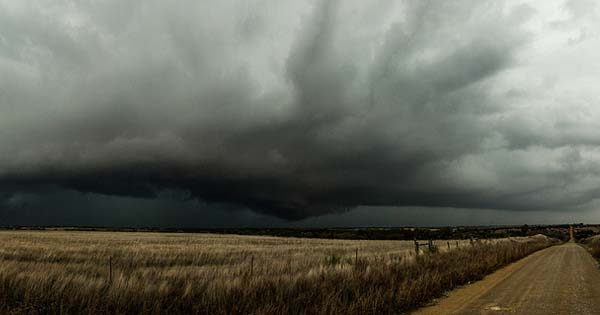What We Chase
A writer mourns colleagues lost in May’s killer storms but knows she'll pursue tornadoes once again

On May 31 of this year, Tim Samaras scrambled along the roads near El Reno, Oklahoma, with his adult son Paul and colleague Carl Young, when what they’d been hoping to intercept caught them. The national Storm Prediction Center had issued a “Particularly Dangerous Situation” warning across central Oklahoma. Such cautions should send people fleeing to shelters and basements, but Tim, like hundreds of other storm chasers on the road that day, pressed on. Later that afternoon, Tim and his companions were unable to outrun the winds when one storm’s entire mesocyclone—the core of its spinning heart—dropped to the ground. Their car sailed through the air, tossed and tumbled, and came to rest half a mile away. They were the first known storm chasers to die in pursuit of a tornado.
Many veteran chasers felt caught off guard by the behavior of this tornado, by its speed and size, and the direction it turned—a sharp left hook at the end of its path. They raced along roads perpendicular and parallel to its base, often barely escaping the outer circulation of the winds. In one video, Jeff Piotrowski narrated his experience in real time as the fuzzy wedge spun across an open field toward him, dropping debris on his car. The width of the wedge doubled over just a few frames, transforming from a clearly defined structure with gauzy skirts of rain into a nebulous mass, hazy and gray, as though the sky had collapsed onto the earth. His voice sounds erratic as he stumbles over words he has to yell to be heard: “It’s gaining on us!”
The architecture of this tornado is partly to blame. What began as a delicate ballet of two intertwined funnels evolved into an indefinable sheath of dust and debris. The boundary between tornado and not-tornado blurred, the margin undulating as the storm pulled moist air into its core. At its peak, the rotation swelled to a record 2.6 miles in diameter and generated winds of nearly 300 miles per hour, the top of the Enhanced Fujita Scale, the standard for rating damage. The excitement of tracking such a massive storm might well have masked the danger.
I, too, was on the road that day, helping facilitate a field studies course for a group of Virginia Tech meteorology undergraduates. As a chaser, I find it difficult to explain to someone who hasn’t chased what compels us to seek pleasure from risk. What it’s like to drive 5,000 miles to stand on a dirt road bisecting a green line of prairie and watch a rope of water vapor and air scour the ground. Or to feel the texture of the winds behind you whip the back of your legs, pelting them with fine granules of sand and rock as the towering cumulonimbus suspended in front of you intensifies its spin. A supercell can consume a horizon for miles, its top flattening into an anvil against the ceiling of the troposphere. Below, a cauliflower body erupts, ingesting warm, moist air from the pocket between land and clouds, through the updraft, the column of violence at the center of the storm.
Videos usually document the thrill of a tornado, providing proof of the chaser’s talent and daring. Those from May 31 instead offer forensic evidence, documentation that might piece together the last moments of a researcher known for his kind demeanor and widely respected for his meteorological inventions. My group’s reaction to Tim’s death reflected the tenor of the larger chase community. We were sobered and stunned by the counterfactual of our own choice: parked near a Walmart in El Reno, scrutinizing the radar, we were close to this supercell when it developed. We chose more benign routes south of Oklahoma City, but had we decided to join the fray, we too might have been killed.
This realization profoundly affected the leaders of our group, all of them fathers. “I can’t imagine any storm worth not coming home to my son,” Dave said. Kevin, about to be a dad for the second time, continued to ruminate over the details of Tim’s demise long after we returned to Virginia. He wondered if he’d ever chase again.
His was a common refrain: Should we continue our pursuit? Ought we create rules that ensure safety? Who should teach and enforce those rules?
Answers to these questions won’t come easily. Chasers journey to the Great Plains each spring with different ambitions: they want to assist local authorities by providing “ground truth” for forecasts or hope to catch a glimpse of something rare or are simply curious. They chase out of a sense of adventure, feel compelled to discover the mechanisms of tornadogenesis—we know surprisingly little about why tornadoes form. At times, these motives lead to what we call chaser convergence, our term for the chaotic assemblage of vehicles jostling for position on back roads and interstates. In such moments, we are indistinguishable from one another in our urgent rush to safety and in our motives, which suddenly seem inconsequential.
Sitting in a parking lot dozens of miles from Oklahoma City later that night, I searched Facebook for updates from friends who I thought had likely taken shelter. I hoped that they and their families were unharmed, that there would be no casualties. Recalling place names like Greensburg and Joplin, Saragosa and Hallam, however, I knew better. As I watched the storms diminish, I felt guilty and ashamed and generally confused about my emotions. I didn’t want to be there; none of us should have been there. There is no pleasure in the suffering of others.
Still, chasing remains for me a form of religious practice, an encounter with the Wordsworthian sublime. The heavens rend terrifying and beautiful, evoking a sense of exposure and revelation tightly coupled. Almost in spite of myself, I know I’ll join the chase again.

